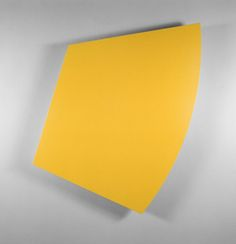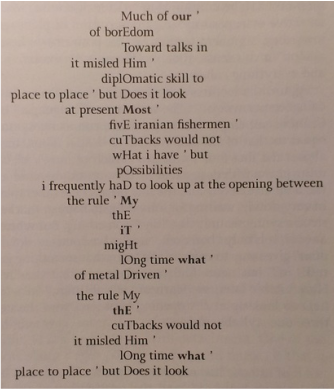The sort of art, and the sort of "poetry," which appeals to her is like this, John Cage's so-called "mesostic strings":

In my book Sonnets, as I said, I wrote poetry in response to an exhibition of work by Horace Pippin. In contrast, I posited Ellsworth Kelly—the Art Institute has several large pieces of his (geometric "shapes"?) of which it is very proud but which have never moved me. Pippin is no Michelangelo to be sure; but then, what do we need two Michelangelos for anyhow? His art is akin to the sort sometimes classified as "primitive" or rather "folk art"; something a critic like Perloff might find not worth her intellectual rigor. And yet it holds meaning.
I mentioned his absorption on John Brown and Abraham Lincoln—so at least that aspect of his art may be viewed as an iconography of the Civil War era. Icons—insofar as they provide objects of worship or veneration, like a Buddha head—don't have to be beautiful in their technique to satisfy a devotee. The best art perhaps satisfies both aesthetics and denotative typography, though an Impressionistic landscape or Islamic filigree may be beautiful without reference to iconography.
Pippin also painted movingly on themes of the First World War, having been himself a soldier. A portrait of a family by his brush opens a window onto human possibility—nothing which is human is alien to me—and so it enriches my outlook and introspection both.
Perloff has a telling anecdote—one which made a deep impression on her as she frequently brings it up in her recorded lectures and has written about it. In her "poetry seminar at Stanford" a "perplexed graduate student" asked (presumably of their objects of study), "Why can't they write like Kafka?"
Perloff elaborates:
Why is Kafka's extraordinary lucidity, the natural speech and "normal" syntax that paradoxically conveys the densest and most ambiguous meanings, no longer a viable model? There is no easy answer... but we might begin with the notion that whereas Kafka positioned himself vis-à-vis the discourses of law, of justice, and of the bourgeois respectability and normalcy that characterized the Prague of his time and place, our own contact with these discourses tends to be always already mediated by a third voice, the voice of the media. [from Radical Artifice]
According to the view of some critics:
Perloff... sets up a kind of "us vs. them” opposition, which is of course a favored rhetorical tool used by avant-garde schools in the past from Futurists and Dadaists to Language School poets. Avant-garde manifestos have always assumed a tone of masculine and expansionist militancy, enforcing an aggressive divide-and-conquer framework to grab the reader’s attention. Of course, this “us vs. them” rhetoric can be used to an exhilarating effect when there is a revolutionary legitimacy to that opposition, when “we” are the rabble-rousing outliers and “they” are the hegemonic majority. But Perloff sets up an opposition that’s far more disconcerting: oddly, the hegemony has become the nameless hordes of “African Americans, other minorities, and post-colonials"....
In the essay (critiquing Dove's editorship of The Penguin Anthology of Twentieth-Century American Poetry), Perloff suggests that "what Penguin’s editorial team seems to be saying is that the value of Dove’s anthology’s [selection of poetry] depends not on its overall plan or on the wisdom of its selections—its capacity to satisfyingly delineate a poetic canon or make some claim about the nature of poetry in a certain time or place—but on the prestige of its editor." Moreover,
Accuracy is not this editor’s strong suit: the “serious artists” of the early twentieth century were not “affected by” modernism; they created it. The Beats did not “clear a trail” for the Confessionals: the two groups coexisted and sometimes overlapped throughout the 1950s and ’60s. And higher education may be credited with many things but perhaps not with casting a “spell” over fledgling poets. As I was reading these curious assertions, it occurred to me that perhaps this Penguin anthology was designed for Junior High School students—kids forced to study something called poetry, who would find those references to “crawling out of the wreckage of the Civil War” or to the “take-no-prisoners approach” of the Beats both accessible and colorful. “Into this disquieting age strode Wallace Stevens”: it sounds like a sentence in a Victorian children’s book. And since the editor is an undisputable star, the recipient of just about every prize and award there is, a former poet laureate, and currently a commonwealth professor of English at the University of Virginia, one evidently wants to read her anthology to learn not about American poetry of the twentieth century but about her likes and dislikes.
Given the sheer absurdity of the suggestion, no wonder a portion of Perloff's critics fling themselves into an incoherent tizzy. In my essay on Claude McKay, I refrained from making the case that the poet's virtual exclusion from English Lit departments in academia is due at least in part to undisclosed racism, especially on the part of poetic Neo Formulists where their cult practice has taken root, but the case would not be hard to make. How much less difficult then in the arena of "Conceptualism" which is Perloff's forte. (I don't believe Perloff is racist.) Considering Marcel Duchamp's urinal, I could envision none other than "colonial aesthetics" of the idly wealthy as furnishing the ground. I may be wrong—but I lack the interest to investigate and the audacity to make an argument about the case.
Recently I asked, "Where's the poetry?" The idea of "tearing down Conceptualism" no doubt excites the imagination of some of Perloff's critics. However ad hominem attacks accomplish little beyond an undermining of their cause. Let them consider, not how to write like Kafka, but with the clarity and relevance of a Kafka.
While I should prefer to eschew racial polemics, my attention was piqued by this passage by Cathy Park Hong.
If we are to acknowledge that there are formal choices that define avant-garde poetry such as polyvocality, hybridity, collage, stream-of-conscious writing, and improvisation, these techniques were not only used but were actually first inaugurated by African American writers or they were America's early practitioners. Jean Toomer’s Cane, written in 1923, is an uncategorizable cross-genre book that is wide-ranging in its experimentations with fragmentation, stream-of-consciousness, and surrealist wordplay. Before academic words like hybridity and heteroglossia became en vogue, Harlem Renaissance socialist poet Claude McKay—whose work inspired key figures like Aimé Césaire and Leopold Senghor from the Negritude movement—experimented with Jamaican dialect and code-switching in his collection Constab Ballads.
McKay’s characterization as a “socialist poet” is frustratingly simplistic. The poet, who would write,
Around me roar and crash the pagan isms
To which most of my life was consecrate,
Betrayed by evil men and torn by schisms
For they were built on nothing more than hate!
Perloff has a markedly continental perspective that is not shared by many of her detractors (she was born in Vienna). Eurocentrism possibly becomes less and less relevant to daily life in America; yet the impress of European literary culture is irrefutable. As I say, I am no defender of her literary taste: Kafka sounds to me like an ideal candidate for emulation by tyro writers. But then so does McKay.
Neither engaged in intellectual gamesmanship for its own sake, and that keeps them relevant.


 RSS Feed
RSS Feed